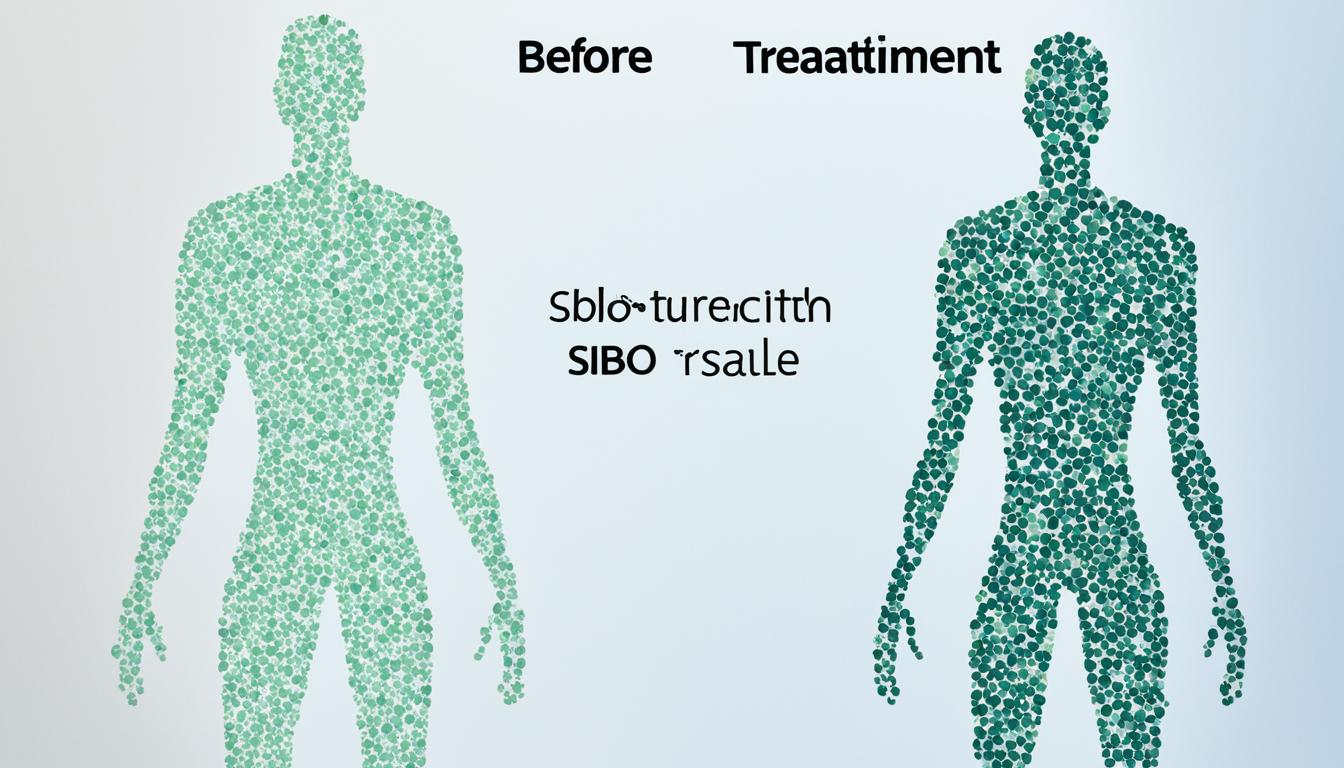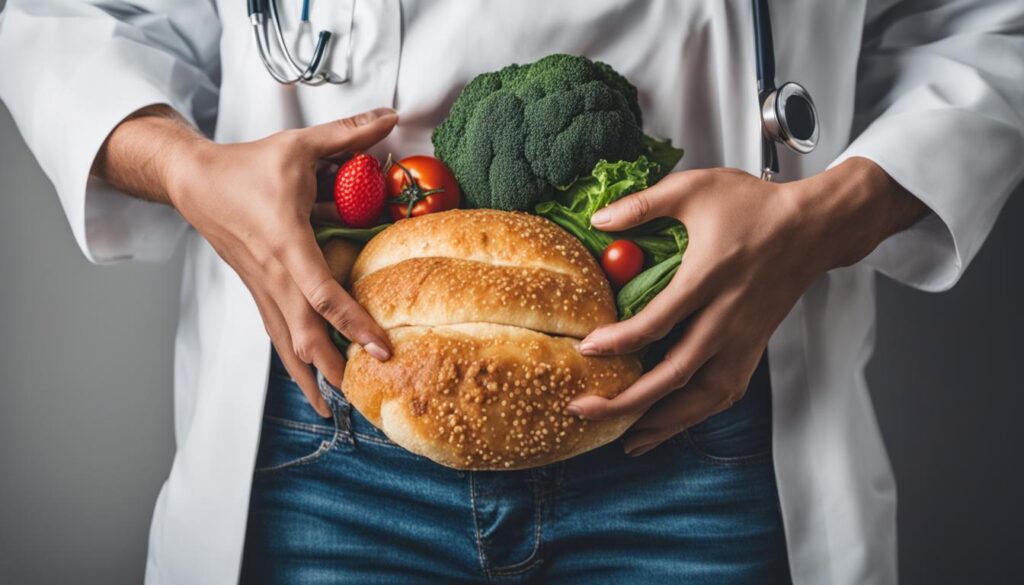
SIBO treatment can have varying effects on weight. While some individuals may experience weight loss as a result of decreased bloating and inflammation, others may not see significant changes in their weight. The impact of SIBO treatment on weight can depend on factors such as individual metabolic differences and underlying causes of SIBO.
Key Takeaways:
- SIBO treatment can lead to weight loss by reducing bloating and inflammation.
- Individual metabolic differences and underlying causes of SIBO can affect weight change after treatment.
- Managing small intestinal bacterial overgrowth and weight requires personalized approaches.
- Working with healthcare professionals and registered dietitians can help develop effective weight management plans.
- A balanced diet, regular physical activity, and addressing underlying factors are crucial for long-term weight management after SIBO treatment.
Understanding SIBO: Causes and Symptoms
SIBO, or small intestinal bacterial overgrowth, occurs when there is an overgrowth of bacteria in the small intestine. This condition can be caused by various factors, including poor gut motility, structural abnormalities in the digestive system, or a weakened immune system.
Common symptoms of SIBO include:
- Abdominal pain
- Bloating
- Diarrhea
- Constipation
- Nutrient malabsorption
SIBO causes digestive symptoms, such as abdominal pain, bloating, diarrhea, and constipation. Additionally, it can lead to nutrient malabsorption, affecting the body’s ability to absorb essential nutrients properly.
If you’re experiencing these symptoms, it’s essential to consult with a healthcare professional for an accurate diagnosis. They can recommend appropriate tests and develop a personalized treatment plan to manage SIBO effectively.
The Causes of SIBO
SIBO can be caused by:
- Poor gut motility: When the normal movement of the intestines slows down or becomes impaired, it can allow bacteria to accumulate in the small intestine.
- Structural abnormalities: Conditions that cause structural abnormalities in the digestive system, such as strictures or physical obstructions, can promote the growth of bacteria in the small intestine.
- Weakened immune system: Certain medical conditions, such as immunodeficiency disorders or autoimmune diseases, can weaken the immune system’s ability to control bacterial overgrowth in the small intestine.
Identifying the underlying cause of SIBO is crucial in developing an effective treatment plan. Your healthcare provider can help determine the primary cause and recommend appropriate interventions.
Recognizing SIBO Symptoms
“The symptoms of SIBO can vary in severity and may overlap with other digestive disorders.”
While abdominal pain, bloating, diarrhea, constipation, and nutrient malabsorption are the common symptoms of SIBO, it’s important to note that these symptoms can vary in severity and may overlap with other digestive disorders. Proper diagnosis is important to differentiate SIBO from similar conditions and to facilitate targeted treatment.
The Connection Between SIBO and Weight Gain
SIBO, or small intestinal bacterial overgrowth, can contribute to weight gain through various mechanisms, including bloating, inflammation, and impaired nutrient absorption. Let’s explore each factor in detail.
Bloating and Weight Gain
Excess bacteria in the small intestine can produce gas, leading to bloating. This bloating can give the appearance of weight gain, even though it primarily consists of trapped air and fluid retention. Individuals with SIBO may experience abdominal distension, causing their clothing to feel tighter and their weight to appear higher on the scale.
Inflammation and Weight Gain
SIBO can trigger inflammation in the small intestine, which can result in weight gain. Inflammation stimulates the release of stress hormones, such as cortisol, which can promote weight gain, especially in the abdominal area. In addition, chronic inflammation can disrupt the normal functioning of hormonal pathways involved in appetite regulation, leading to increased food intake and potential weight gain.
Impaired Nutrient Absorption and Weight Gain
The presence of excessive bacteria in the small intestine can damage the intestinal lining, impairing nutrient absorption. This can lead to inadequate absorption of essential nutrients, such as vitamins, minerals, and macronutrients, which are crucial for maintaining a healthy body weight. The body may respond to this nutrient deficiency by triggering hunger signals, potentially resulting in increased food intake and subsequent weight gain.
To better understand the connection between SIBO and weight gain, it’s important to recognize that this relationship is complex and can vary among individuals. The severity of SIBO, the underlying causes, and individual metabolic differences can all influence the degree of weight gain experienced.
Managing weight gain in SIBO involves addressing the underlying factors contributing to the condition, such as bacterial overgrowth, inflammation, and impaired nutrient absorption. This typically requires a comprehensive treatment approach that includes targeted therapies to eliminate the excess bacteria, anti-inflammatory measures, and optimizing nutrient intake through a well-balanced diet.

The Process of SIBO Treatment
SIBO treatment involves a comprehensive approach that combines antibiotics, herbal therapies, and dietary changes. This multi-faceted approach aims to target and eliminate the overgrowth of bacteria in the small intestine, alleviate symptoms, and promote gut healing.
Antibiotics for SIBO
Antibiotics, such as rifaximin, are commonly prescribed for SIBO treatment. Rifaximin is an antibiotic that specifically targets the bacteria present in the small intestine, without significantly affecting the beneficial bacteria in the gut. It is highly effective in reducing bacterial overgrowth and relieving symptoms of SIBO.
Herbal Therapies for SIBO
In addition to antibiotics, herbal therapies can also be used as an alternative or complementary treatment for SIBO. Certain herbs, such as oregano oil, berberine, and neem, possess antimicrobial properties and can help combat the overgrowth of bacteria in the small intestine. Herbal therapies can be a natural and effective option for individuals seeking alternatives to antibiotics.
Dietary Changes for SIBO
Dietary changes play a crucial role in managing SIBO and supporting gut healing. A low FODMAP diet, which restricts certain types of carbohydrates that feed the bacteria in the small intestine, is often recommended for individuals with SIBO. This diet can help reduce symptoms such as bloating, gas, and abdominal pain. Additionally, eliminating trigger foods and adopting a well-balanced, nutrient-dense diet can optimize overall digestive health.
To summarize, SIBO treatment involves a combination of antibiotics, herbal therapies, and dietary changes. Antibiotics like rifaximin target the overgrowth of bacteria, while herbal therapies offer a natural alternative. Dietary changes, such as a low FODMAP diet, can help manage symptoms and support gut healing. Consulting with a healthcare professional is key in developing a personalized SIBO treatment plan.
Weight Loss Expectations After SIBO Treatment
After SIBO treatment, individuals may experience some weight loss, primarily due to reduced bloating and inflammation in the digestive system. However, it’s important to note that this initial weight loss is primarily attributed to a decrease in excess gas and fluid, rather than a loss of body fat.
The immediate effects on body weight after SIBO treatment can vary from person to person. Some individuals may see a noticeable reduction in their weight, while others may not experience significant changes. Factors such as metabolic differences and underlying health conditions can influence weight loss after SIBO treatment. It’s important to consult with a healthcare professional or registered dietitian for personalized guidance.
While the initial weight loss after SIBO treatment may be encouraging, long-term weight management requires adopting a holistic approach. This includes implementing a balanced and nutritious diet, engaging in regular physical activity, and addressing any underlying factors that may have contributed to SIBO.
A balanced and nutritious diet is crucial for maintaining a healthy weight and supporting overall well-being. Focus on consuming a variety of whole foods, including fruits, vegetables, lean proteins, whole grains, and healthy fats. Avoid excessive consumption of processed foods, sugary snacks, and beverages high in calories.
Incorporating regular physical activity into your routine can also be beneficial for weight management after SIBO treatment. Engaging in activities such as brisk walking, jogging, cycling, or strength training can help burn calories, build muscle, and improve overall fitness levels.
It’s important to address any underlying factors that may have contributed to the development of SIBO in order to achieve and maintain long-term weight loss. Working with healthcare professionals and registered dietitians can provide valuable guidance and support in identifying and addressing these factors.
In summary, while SIBO treatment may result in some immediate weight loss, it’s crucial to adopt a comprehensive approach to long-term weight management. This includes following a balanced and nutritious diet, engaging in regular physical activity, and addressing underlying factors that may have contributed to SIBO. By prioritizing overall health and wellness, individuals can achieve and maintain their desired weight after SIBO treatment.

Conclusion
In conclusion, the effects of SIBO treatment on weight can vary among individuals. While some may experience immediate effects on body weight, maintaining a healthy weight requires long-term strategies. It is important to work with healthcare professionals and registered dietitians to develop personalized plans for weight management after SIBO treatment.
After undergoing SIBO treatment, individuals may experience weight loss due to reduced bloating and inflammation. However, it is essential to note that this initial weight loss is primarily related to a decrease in excess gas and fluid in the digestive system, rather than a loss of body fat.
To manage weight effectively after SIBO treatment, adopting a balanced and nutritious diet is crucial. Incorporating regular physical activity into daily routines can also promote weight management. Additionally, addressing underlying factors that may have contributed to SIBO is vital for long-term success.






